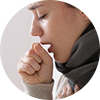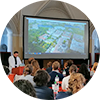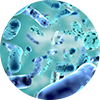
Whooping cough (pertussis) is a bacterial, highly contagious infectious disease that affects the respiratory tract. Strong coughing fits are characteristic, which can last up to several weeks and significantly affect the quality of life.
It is transmitted by droplet infection, so it is important to follow basic hygiene measures:
The incubation period is 6-21 days. A sick person is most infectious in the first 2 weeks (sometimes longer) and it is necessary to isolate him from others.
The risk group is mainly newborns, elderly people, chronically ill individuals with asthma or COPD (chronic obstructive pulmonary disease) and pregnant women.
Whooping cough usually begins as a common respiratory illness with a runny nose, mild cough, and fever. Later, spasmodic attacks of dry cough occur and the patient often cannot breathe. Vomiting, bleeding from the nose or conjunctiva, weight loss and general exhaustion may occur during attacks.
More serious complications include pneumonia, broken ribs, short-term inability to breathe, the formation of a hernia, etc. In the case of a severe course, hospitalization in a hospital is necessary.
The disease is diagnosed according to clinical manifestations and laboratory tests (swab from the back wall of the nasopharynx, serological blood test).
The treatment of whooping cough is always in the hands of a doctor and consists of targeted treatment with antibiotics (most often macrolides). If recognized early, they reduce the duration, severity and shorten the time a person is contagious. As part of supportive treatment, it is advisable to take care of a sufficient supply of fluids, rest and, to facilitate breathing, regularly ventilate, possibly. humidify the air in the room.
The most effective form of prevention is vaccination. However, it only provides protection for a limited time and revaccination is therefore necessary.
Free according to the SZÚ web portal, NZIP and the European information portal on vaccination, 19.3.2024

24. 4. 2024
In continuation of the tradition started last year, we have prepared a half-day lecture for foreign university students from the Netherlands on April 19, 2024...

29. 2. 2024
Probiotics are live bacteria that can have a beneficial effect on human health. They are generally called lactic acid bacteria. It is mainly about...